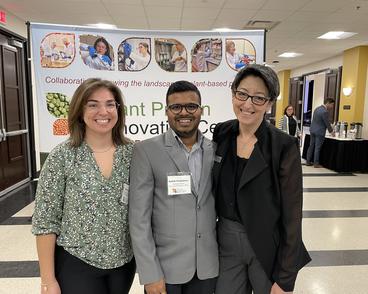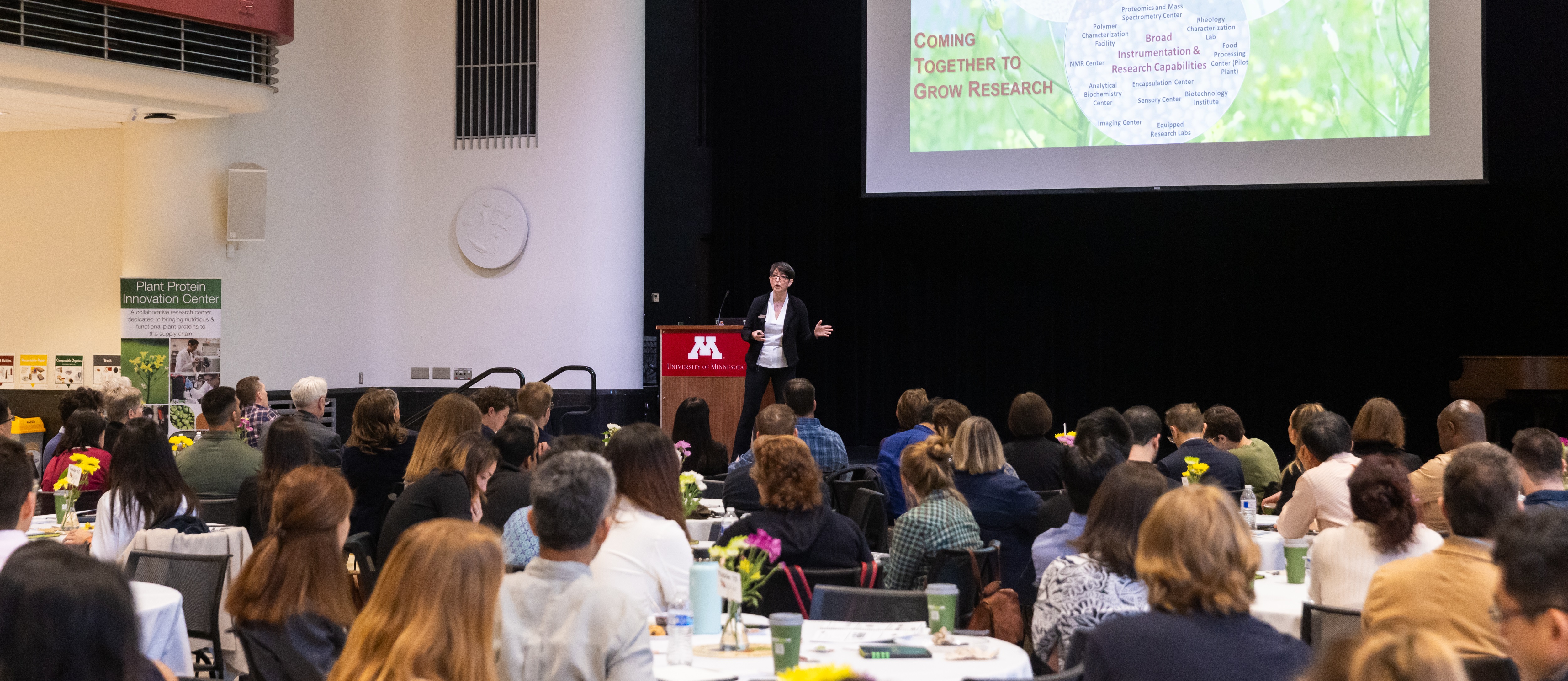
5th Annual Research Spotlight Meeting 2024
The attendees also engaged in interactive poster sessions featuring current PPIC funded projects as well as other research projects from several institutions. The sessions allowed guests to meet and engage with several students and post-doctoral researchers. “These poster sessions are a great benefit to both the student researchers and industry,” notes PPIC Director Prof. B. Pam Ismail. “Students get the opportunity to showcase their work, while industry participants get to ask questions about the research and connect with future research talent for hire.”
During the networking sessions, several PPIC member companies hosted booths to share their ingredients/products, technologies, and engineering capabilities with the attendees. Such sessions have paved the way for many research and B2B collaborations.
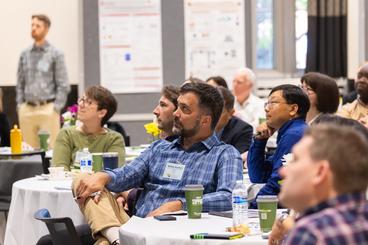
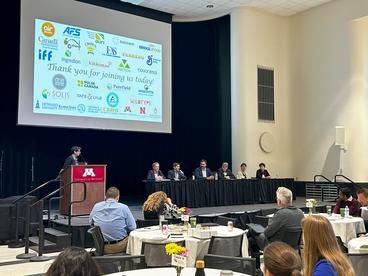
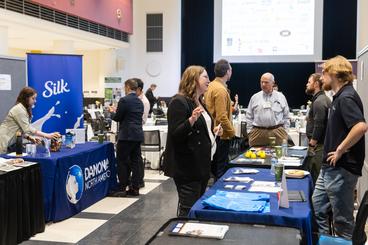
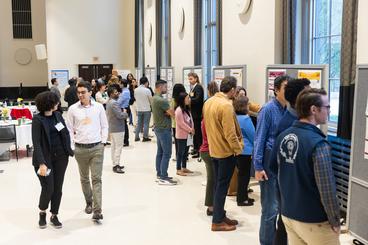
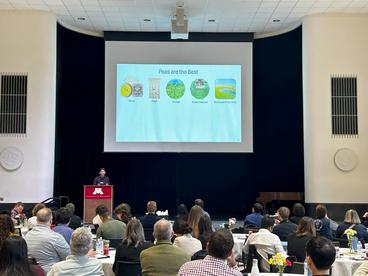
5th Annual Research Spotlight Agenda
Speakers
Stephan Drusch, Professor, Technische Universität Berlin

Keynote Speaker
Biography
Dr. Stephan Drusch is Professor for Food Technology and Food Material Science at Technische Universität Berlin. He studied at the University of Kiel (Diploma, PhD) and worked as a researcher in the dairy industry, at the University of Kiel, Germany, and the University of Milan, Italy. He is member of the scientific advisory board of the Research Association of the German Food Industry (FEI) and the Federal Ministry of Food and Agriculture. His research activities focus on structure-function relationships in food processing with emphasis on dispersed systems and the encapsulation of food ingredients.
Presentation: Challenges and opportunities for plant proteins from agri-food side streams
There are multiple high protein side streams in food processing, which are not efficiently utilized yet. Presence of undesirable minor constituents, sensory aspects and structural modification of the proteins during processing and are among the challenges, when setting up a strategy for their recovery and use as food ingredient. Furthermore, the protein fraction inherently represents a heterogeneous mixture of individual proteins with varying techno-functional potential. The presentation will focus on these aspects using canola protein as an example to unravel the interplay between protein composition, structure and functionality in dispersed systems.
Carmen I. Moraru, Professor and Chair, Cornell University

Biography
Dr. Moraru is a Professor and Chair in the Department of Food Science at Cornell University. Her research focuses on using engineering principles to improve food quality, safety, and sustainability. Research projects include using High Pressure Processing for modifying protein structure and functionality, membrane filtration , microwave vacuum drying, and microbial inactivation using light-based technologies. Besides numerous awards, in 2019 she received the title of Doctor Honoris Causa from the University of Agronomic Sciences and Veterinary Medicine of Bucharest, Romania, and in 2020 was elected as Fellow of the Institute of Food Technologists.
Presenting: A novel approach to plant protein processing by high pressure structuring
Increased utilization of pulses can benefit the environment and global food security, but challenges related to texture and taste of pulse products need to be overcome to increase their consumer acceptance and utilization. This presentation will discuss the effects of high pressure processing (HPP) on pulse protein concentrates, including a comparison with heat treatment. HPP and heat treatment denature pulse proteins and increase their surface hydrophobicity, which at high protein concentration facilitates the formation of strong gels with high water holding capacity. These gels' structure and texture can be further modulated by acidification and calcium addition. These results can help guide new product formulation of high-protein food applications using pulse protein ingredients.
Solmaz Tabtabaei, Associate Professor of Chemical Engineering, Howard University
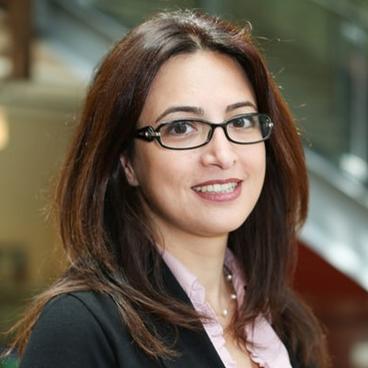
Biography
Dr. Tabtabaei is an associate professor of chemical engineering at Howard University. She earned her Ph.D. from the University of Toronto and received the "Global Engineering Leaders Award" based on her research accomplishments. She then received an MITACS Elevate Postdoctoral Fellowship and joined the University of Waterloo as a postdoctoral scholar before joining Howard in August 2016. Her research focuses on bio-separation, plant protein purification, agro-materials' tribo-electrification, 3D food printing, and nanofiber characterization. Dr. Tabtabaei received research funding from USDA, NSF, and Amgen and authored over 65 manuscripts and conference presentations.
Presenting: Electrostatically enriched plant proteins and their application in 3D food printing
Tribo-electrostatic separation (TES) is a waste-free approach to dry-fractionating milled legumes, cereals, and oilseed meals, producing functional protein concentrates. Through TES, milled particles of agro-materials are charged using tribo-charger tubes of different materials through pneumatic transfer and fractionated under an electric field. The uniform particle size distribution of dietary fiber and protein particles restricted the protein enrichment in cereal groats and oilseeds compared to legumes. The TES analysis on binary mixtures of protein-starch and protein-fiber showed that the initial protein content plays a crucial role in high protein enrichment. Enriched legume proteins exhibited superior rheological and viscoelastic properties as 3D printing materials for healthy snacks.
Lutz Grossmann, Assistant Professor, University of Massachusetts Amherst

Biography
Lutz Grossmann is an Assistant Professor in Food Science at UMass Amherst. Lutz obtained his PhD in Food Science and Technology at the University of Hohenheim. His research focuses on facilitating a sustainable food system transition by designing holistic approaches to increase the consumption of plant- and microbial protein-rich foods. He is especially interested in combining up- and downstream processing technology with molecular, physicochemical, and engineering concepts to create food textures that are nutritious, sustainable, and tasty. His research was awarded the Nestlé Young Scientist Award, the Südwestmetall-Förderpreis and the FOSS Young Talent Award. He currently has a publication record of 51 publications and two books.
Presenting: Tasty but Slippery: Liquid Oil Feeds and their Impact on High-Moisture Extrusion Processing
The incorporation of lipids in the extrusion process to produce composite protein-lipid high-moisture meat alternatives is a major challenge due to slip conditions induced by the oil phase. Lipids are, however, an integral part of the eating experience and deliver important nutritional and sensory attributes such as mouthfeel, flavor, and vitamins. Overcoming the 'lipid bottleneck' in high-moisture extrusion processing would ultimately enable the design of novel product categories, such as marbled plant-based meats. In this talk, I will discuss potential solutions to overcome the introduced slip conditions when oil is used in the liquid feed. The focus of the talk will be on the effect of emulsified feeds on the processing and textural properties of a high-moisture meat alternative.
B. Pam Ismail, PPIC Founder & Director, Professor, University of Minnesota
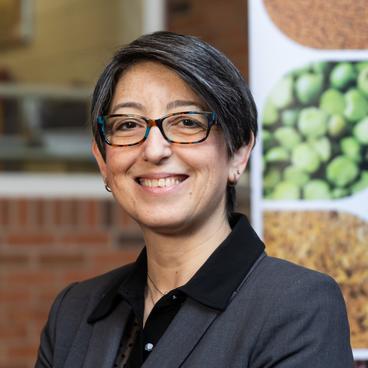
BIOGRAPHY
Dr. Pam Ismail is the Founder and Director of the Plant Protein Innovation Center and is a Professor at the Department of Food Science and Nutrition, University of Minnesota. Dr. Ismail has over 28 years of experience in Food Chemistry research focused on analytical chemistry, protein chemistry, and chemistry and fate of bioactive food constituents. Her research focuses on structural characterization and enhancement of functionality, safety, bioavailability, and bioactivity of food proteins, following novel processing and analytical approaches. She is the recipient of a “Distinguished Teaching Award” and an “Outstanding Professor Award”.
Presenting: Plant proteins are a foe or a friend? Extraction and modification remedies
The demand for plant-based, novel, and sustainably sourced protein ingredients is steep. While plant protein is gaining traction, functionality limitations is hindering their market growth. Improving plant protein functionality will enable successful utilization in various food applications. This presentation will demonstrate enhancement in plant protein functionality through a combination of controlled extraction and modification approaches. There is not one size that fits all. Because each protein source is unique, specific upstream and downstream processes will result in targeted enhancement in functionality. Different plant protein sources (e.g. hemp, pea, chickpea, and pennycress) will be featured along with specific extraction and modification strategies that resulted in marked enhancement in either solubility or gelation properties.
Fernanda F. G. Dias, Assistant Professor, University of Minnesota

Biography
Dr. Fernanda Dias is an Assistant Professor of Analytical and Food Chemistry at the Department of Food Science and Nutrition at University of Minnesota. Dr. Dias obtained her Ph.D. in Food Science and postdoctoral training in Analytical Chemistry and Food Science from the University of Campinas and UC-Davis, respectively. The overall goal of her research is the use of advanced analytical techniques and chemometrics tools to guide the development of processing and storage strategies to produce the next generation of food ingredients.
Presenting: USE OF TUNABLE GREEN SOLVENTS FOR PLANT PROTEIN AND OIL CO-EXTRACTION
Due to the growing world population and the increasing popularity of alternative protein sources, plant-based proteins are becoming central to sustainable food production. Oil bearing materials are a valuable source of high-quality proteins, in addition to being source of edible oil. However, the utilization of plant protein from these materials faces several challenges that hinder its widespread adoption. These include the use of flammable solvents in the defatting process of the flour, and reduced protein functionality and nutritional aspects, and inherent off-flavor. This presentation will explore the application of innovative, tunable green solvents for producing protein isolates and their impact on protein extractability, functionality, and flavor profile.
Juliana de Moura-Bell, Associate Professor, University of California, Davis
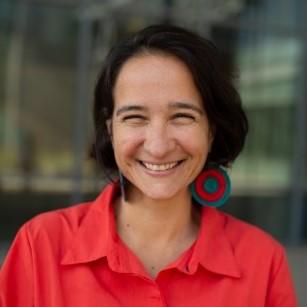
Biography:
Dr. de Moura Bell is an Associate Professor in Food Science & Technology and Biological & Agricultural Engineering at UC Davis. She received her PhD in Food Technology from the State University of Campinas, São Paulo, Brazil. Her research program has focused on developing sustainable processing strategies to extract, modify, and recover food compounds, converting agricultural waste streams/food processing by-products into valuable compounds, and evaluating the effects of thermal treatments on the functionality and biological activities of food compounds. These bio-processing techniques include enzyme-assisted aqueous extraction, fermentation, and less harsh techniques like supercritical and subcritical extractions. Her research interests include: 1) Scaling-up extraction and downstream recovery processes; 2) Determining the effects of processing conditions on the functionality and biological activities of food components and 3) The conversion of agricultural waste streams/food processing by-products into high added-value compounds.
Presenting: Fine-Tuning Sustainable Extraction Processes for Enhanced Protein Functionality and Process Feasibility
The growing demand for plant protein ingredients has prompted the need for feasible and functionality-driven protein extraction approaches. Therefore, a deeper understanding of the impact of key processing steps (e.g., extraction, fractionation, post-extraction modifications) on protein yields and costs, which describes the effectiveness of the process, and their functional properties (e.g., solubility, foaming, and emulsifying properties), which will determine their potential applications in food products, becomes imperative. Importantly, the nutritional and biological properties of the extracted protein, such as amino acid composition, digestibility, and allergenicity, are key aspects that should not be overlooked during the development of extraction and isolation methods of proteins for food, feed, and nutraceutical applications. In this talk, I will describe how aqueous and enzymatic extraction of plant-based proteins can be tailored to promote structural and physicochemical modifications that enhance specific protein functional properties, extractability, and process feasibility. Additional benefits of proteolysis, such as enhanced protein digestibility and reduced allergenicity, will also be discussed.
Steven Mulkey, Research Scientist, University of Minnesota

Biography
Steve Mulkey is a Research Scientist at the University of Minnesota. He earned his doctorate in plant breeding and genetics at North Carolina State University in 2018 before starting a Post-Doc with Dr. Stupar in soybean genetics in Minnesota. In 2021 Steve began developing a winter pea breeding program with the goal of developing food-grade peas that would survive this cold, icy landscape. Steve’s research focuses on developing genetic resources and tools for the research community, modernizing the pea breeding pipeline, and developing an economically profitable, environmentally sustainable crop for Minnesota.
Presenting: Beyond the Pod: Breeding for Protein Quality in Minnesota Peas
As a legume, peas provide a sustainable source of protein for both food and feed industries. Despite growing interest, questions remain about how various pea storage proteins impact functionality. Additionally, protein content can fluctuate greatly within cultivars depending on growing conditions, generating challenges for food processing facilities. The new pea breeding program at the University of Minnesota seeks to develop peas as an economically viable and environmentally beneficial option for farmers. This talk will focus on two areas of research: (a) understanding how intra-plant variation for pod development and maturity impact consistency of pea protein content and quality, and (b) identifying ways to efficiently screen and select superior protein quality in a breeding program.
Yonghui Li, Associate Professor, Kansas State University
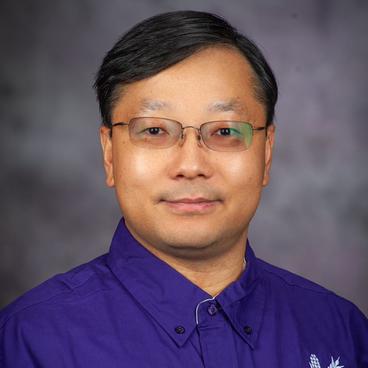
Biography
Dr. Yonghui Li is an Associate Professor at Kansas State University. His research focuses on the structure, chemistry, modification, and functionality of grain proteins and bioactive peptides with the aim of developing high-quality, functional grain-based foods, ingredients, and nutraceuticals. He and his team employ and integrate wet chemistry, engineering principles, computational simulation, and applied machine learning to deepen the knowledge and advance the research on proteins and peptides. Dr. Li has secured $4 million in research funding as the lead PI and has published more than 100 journal articles and 2 patents.
Presenting: AI-Empowered Discovery of Bioactive Peptides from Food Proteins
Developing bioactive peptides and protein hydrolysates for uses in nutraceuticals and functional foods is gaining increasing interest. Traditional wet lab methods can be labor-intensive and time-consuming. With the advent of large-scale protein and peptide datasets and advanced machine learning techniques, AI-based methods can expedite the identification of peptide fragments with targeted bioactivities and complement traditional wet lab approaches. In this presentation, I will share our latest research on the development of prediction models for bioactive peptides discovery, utilizing both conventional machine learning and advanced deep learning methodologies.
Devin Rose, Professor, University of Nebraska-Lincoln

Biography
Dr. Rose is a Professor in the Departments of Food Science & Technology and Agronomy and Horticulture at the University of Nebraska-Lincoln and is a founding member of the Nebraska Food for Health Center, a research center focusing on improving human health by linking agriculture and food production to wellness and disease prevention through gut microbiome research. Dr. Rose’s research focuses on: 1) determining how dietary compounds from grains and pulses can be used to modulate microbial metabolism in the gut and promote host health; and 2) developing messaging to help consumers make healthier food choices.
Presenting: Influence of Animal and Plant Protein Isolates on the Human Gut Microbiota Under High and Low Carbohydrate Conditions
There is a lack of research comparing how proteins and dietary fibers interact to influence the microbiome. This presentation reports changes in gut microbiota composition and function during fermentation of digested protein isolates from beef, egg white, milk, pea, and soy, under high and low dietary fiber conditions. Under low fiber conditions, the microbiota was primarily proteolytic with decreased concentrations of peptides and increased variance among microbial taxa and production of protein fermentation metabolites. Milk protein resulted in the highest production of butyrate and p-hydroxyphenylacetate, but also had high concentrations of deleterious fermentation metabolites. Amino acid composition of the protein isolates was significantly correlated with abundances of many microbial taxa and metabolites, but the correlations were stronger under low fiber conditions. This study suggests that under low fiber conditions, microbiota composition and function may be more influenced by dietary proteins than by dietary fiber.
Girish M Ganjyal, Professor & Extension Food Processing Specialist, Washington State University
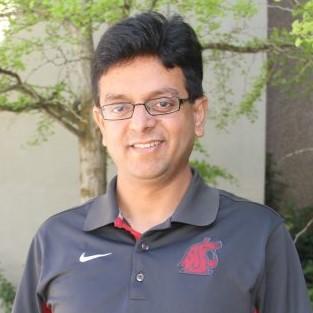
Biography
Girish established the Food Processing Extension and Research program at WSU in 2013. He has mentored 28 graduate students as their major advisor. He has provided research experience opportunities in his program for 42 undergraduate students. He and his team have provided training and project assistance to over 7000 industry professionals since 2013 in the areas of food processing and food safety. Before joining WSU, he worked in the food industry for over nine years at MGP Ingredients, Inc. and PepsiCo, Inc. His team research focuses on extrusion, baking, and frying processes and food ingredient modifications and functionality.
Presenting: Extrusion Processing of Plant Proteins: Chemistry and Engineering Aspects
Texturization of plant proteins is a complex phenomenon. Extrusion processing is a viable tool for the manufacturing of plant proteins despite the challenges. The chemistry of the ingredients and the extrusion processing parameters combined influence the degree of texturization and, thus, the final product quality. Insights into the current understanding of these aspects and opportunities will be discussed.
Amy Rowat, Professor, University of California Los Angeles
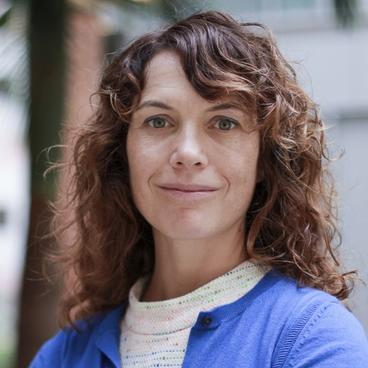
Biography
Amy Rowat is Professor and Vice Chair of Integrative Biology & Physiology and the Marcie H. Rothman Presidential Chair in Food Studies at UCLA. Rowat is the recipient of numerous awards and honors, such as the prestigious National Science Foundation (NSF) CAREER award and a NSF BRITE Fellow award. She has authored over 75 peer-reviewed publications and 5 patents. Dr. Rowat is also founder and director of Science & Food at UCLA that promotes knowledge of science through food and food through science. She has received wide media coverage from outlets like the New York Times, LA Times, NPR, and the Canadian Broadcasting Company (CBC).
Presenting: Towards scalable processes for culturing meat
The rapidly developing field of cellular agriculture—which addresses the challenge of growing muscle tissue ex vivo by harvesting precursor cells from animals and culturing them in a bioreactor—has exciting potential to provide a sustainable alternative method for meat production with reduced environmental impact. However, innovations in production efficiency will be key for scaleup. My group recently developed edible microcarrier scaffolds that have tunable mechanics—which can mimic the natural growth environment of muscle and fat cells—and are compatible with suspension culture. I will show how we can customize scaffold physical properties to support the growth of both myogenic and adipogenic microtissues. Our work also demonstrates how scaffolds provide the foundation for structuring and organizing the growth of both myogenic and adipogenic cells and microtissues.
Reza Ovissipour, Assistant Professor, Texas A&M University

Biography
Reza Ovissipour is an Assistant Professor in the Department of Food Science and Technology at Texas A&M University, where he leads several federally funded projects focused on Cellular Agriculture, sustainable food systems, and alternative proteins, including insect-based food and feed. Committed to advancing the sustainability, safety, and resilience of the food supply chain, he employs technological innovations and contributes to the education of future professionals in the field. Reza Ovissipour earned his Ph.D. in Bioprocess Engineering and another Ph.D. in Biosystems Engineering from Washington State University.
Presenting: Sustainable Materials for Cellular Agriculture
Cellular agriculture has garnered considerable interest as a promising solution to the challenges of conventional farming. However, a significant hurdle in cellular agriculture is the development of suitable biomaterials to scale up production and replace serum in cell culture media. Creating innovative serum-free media for cellular agriculture hinges on various factors, including cell type, protein sources, processing methods, protein concentrations, and protein type. Our research focuses on harnessing microbial, plant, and insect-based polymers to formulate novel serum-free media for cellular agriculture.
Why Should You Attend?
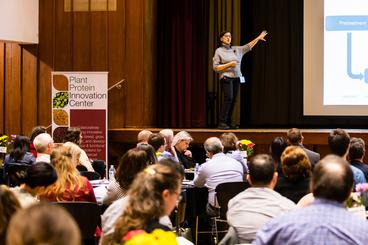
Stay up-to-date on the latest in plant proteins research from expert researchers that are part of the first plant-based research center of its kind in the nation.
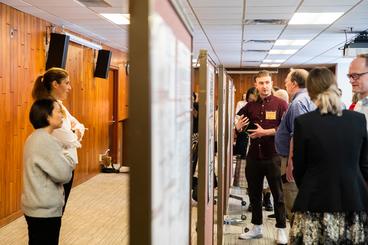
Connect directly with plant protein researchers and procure answers and information from the source.
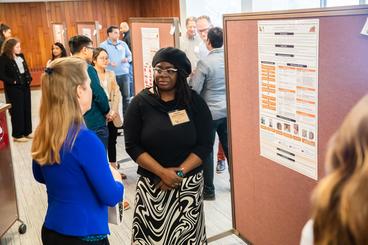
Meet students and post-doctoral researchers that are actively involved in plant proteins research that could be future hires.
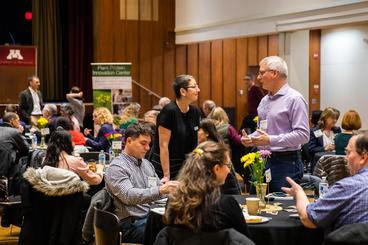
Network with potential suppliers, customers, and collaborators for your company or organization.
